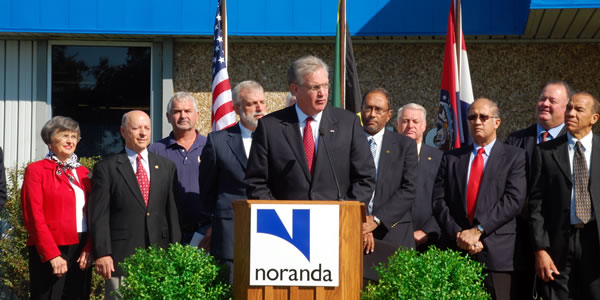
JEFFERSON CITY, Mo. – The sour relationship between Ameren Missouri and its largest customer, Noranda Aluminum, is taking yet another turn for the worst, with the energy consumer taking a case against the company to the Missouri Public Service Commission alleging the energy provider exceeded its allowed earnings in 2013 and is now requesting an even lower electric rate.
Noranda Aluminum, which has an aluminum smelting plant in Southeast Missouri, claims Ameren is earning far more than its allowed 9.8 percent return on equity. The information comes from quarterly surveillance monitoring reports, which Ameren is required to submit to the PSC. The complaint requests the percentage allowed to be lowered to 9.4 percent.
The latest development is another in a series of steps Noranda has taken to criticize Ameren. In recent years, the fight between the two companies has stalled broader negotiations on utility policy between the state’s privately owned utilities and the state’s industrial companies.
The PSC sided with Ameren allowing them to keep their quarterly return on equity numbers private. Lawyers for Noranda, however, are allowed to review the documents but are required to keep the information confidential. In 2012, the company earned 11.66 percent, or $80 million, more than the authorized 10.2 percent return on equity.
It is not illegal for Ameren to exceed its return on equity, a figure is often used by the PSC when setting rates.
Noranda, which consumes more than $160 million a year in energy from Ameren, already pays an electric rate of less than half of what the average consumer pays. The smelter, which produces 260,000 metric tons of aluminum products per year, uses 485 MW of power, 24-7 for 52 percent of the year, the company said – similar to the amount of power consumed by the City of Springifeld, Mo.
Nearly a third of the company’s costs for production at their facility her New Madrid, Mo., are spent on electricity. Still, the increasing profits have prompted them to petition for a lower rate from the PSC. Noranda is proposing an electric rate of $30 for megawatt-hour – down from the $37.84/MWh approved for them in 2008.
“Since the rate relief requested in this Complaint will allow the smelter to remain viable, and the alternative would cause a significant negative economic impact to the State of Missouri in the form of lost taxes, lost gross domestic product, and higher unemployment benefit payments, the requested rate relief is in the public interest,” the complaint reads.
If Noranda’s rates go down, however, the rates for other customers will go up. Noranda was joined in the complaint by the Missouri Industrial Energy Consumers and the Missouri Retailers Association, which believe their members will be better off with the possible rate increase associated with Noranda’s request for relief because they would “not increase as much as they would increase if Noranda is forced to close the smelter.”
Noranda contends that while the price of aluminum – largely set by the London Metals Exchange – had dropped, their electric costs have not. The company argues many of its competitors have lower electric rates than them. “So while the price of aluminum on the LME is depressed, those competing smelters are able to remain viable because of their lower electric rates,” the complaint continued.
Noranda was joined by Gov. Jay Nixon last year to announce a $45 million expansion to expand its facility by 80,000 square-feet and create 29 new jobs. The expansion received significant government aid, including $1.3 million from enterprise zone funding and $40,000 in customized job training funds. Six months later, the company announced it had laid off 75 employees in New Madraid as part of a reduction of 190 employees company wide.
Irl Scissors, executive director of Missourians For a Balanced Energy Future, a group backed by Ameren to help push its legislative agenda, said Noranda’s latest pushback is a “selfish” move by “a single out-of-state company.”
“This corporation is seeking relief for themselves knowing full well the difference will be made on the backs of Missouri residents and small businesses,” Scissors said. “On top of receiving $1.34 million in Missouri tax subsidies just months ago, Noranda is seeking to further decrease their rates, which will be absorbed by other Missouri residents and small businesses.”
In addition to the other industrials that have endorsed Noranda’s move, the complaint received support by U.S. Rep. Jason Smith, state Sens. Gary Romine, Doug Libla and Wayne Wallingford, and state Reps. Kent Hampton, Todd Richardson, Shelley Keeney, and Steve Hodges. Noranda has requested an expedited hearing schedule from the PSC.
Ameren was not included in a utility bill in the Missouri legislature this year with the other privately owned utility companies, Kansas City Power and Light and Empire District Electric Company. Sen. Brad Lager, chairman of the state Senate Committee with oversight on the issue, said he wanted to move a successful bill forward for the other utilities this year, even if Ameren and Noranda couldn’t reach an agreement.
“Just because you can’t get along with your customers doesn’t mean I have to punish others,” he said of the fight. “If you can ever get to resolution with your customers and they’ll not fight this, that’s fine. But I cannot imagine a scenario where either get to an agreement.”
